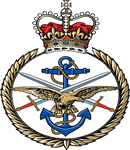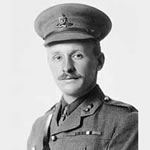Commemorated: | |||
| 1. Memorial: | Freemasons VC Memorial | Great Queen Street | |
Awards & Titles: | Victoria Cross Member, Order of the British Empire Queen's South Africa Medal 6 Clasps King's South African Campaign Medal 1901&1902 Clasps 1914 (Mons) Star British War Medal Victory Medal | ||
Early Life :
Image credit: © Imperial War Museum (Q79792)See also: Royal Borough of Kensington & Chelsea.
Born on 7th July 1880, in the Registry District of Chelsea, London, George Thomas Dorrell was 15 years old when he joined the army, although the ‘official’ age registered was 19. His regimental number 12343, Royal Horse Artillery (RHA). He gained rank and served in the Second Boer War as a Sergeant, being present at 6 notable places: Paardeberg, Dreifontein, Johannesburg, Diamond Hill, Belfast and at the Relief of Kimberley. He went on to serve in India in Lucknow circa 1905 and qualified as a Battery "Rough Rider". By 1908 he was based at the Royal Artillery Barracks at Ipswich, and by the outbreak of war in 1914, he would have been an experienced and highly trained gunner and by the time of his most notable action, he had attained the rank of Battery Sergeant Major.
Service Life:
Campaigns:
- The Second Anglo-Boer War 1899-1902, South Africa.
- The First World War 1914-1918, World-wide.
- The Second World War 1939-1945, World-wide.
| Unit / Ship / Est.: Royal Horse Artillery |
| Action : War Survivor |
Although many perished in times of national conflict and in the service of their country, many more survived including those interned as Prisoners of War. Stories of those who did survive are included as part of this site, especially those with high gallantry awards, those included against an external rolls of honour and those who had a distinguished career in wartime and military leaderhip.
Detail :
See also: VC & GC Association.
By 30 August 1914, the German drive towards Paris had pushed the British and French southwards across the River Aisne. On 1 September at Néry, on the southern edge of the Forest of Compiègne, ‘L’ Battery, Royal Horse Artillery, which had already distinguished itself at Mons, performed another notable brief holding action. Early that morning the German 4th Cavalry Division caught up with the British 1st Cavalry Brigade. ‘L’ Battery, which was bivouacked in an orchard, came under fire from German guns at a range of less than a thousand yards. Men and horses were blown to pieces. Calling for volunteers, Captain E K Bradbury succeeded in turning three guns on the enemy to return fire. Two were soon hit. Bradbury acted as layer for the remaining gun with Sergeant D Nelson as range setter. Nelson was soon wounded but refused to seek medical attention. When they were joined by Sergeant Major G T Dorrell, Bradbury set off to run the twenty yards to the ammunition wagon, when a shell blew off his leg. Despite this, he continued to direct fire until he was hit again. 1st Battalion The Middlesex Regiment and The Cameronians (Scottish Rifles) relieved the British force and eventually captured twelve German guns. The British then withdrew with the surviving gunners and cavalrymen, just as the German infantry appeared.
Citations & Commemorations :
On 1 September 1914, at Nery, France, during a fierce attack by the enemy, all the officers of 'L' Battery were either killed or wounded, including the officer (Edward Kinder Bradbury) in command, who, although having had one leg taken off by a shell, continued to direct the firing until he died. Battery Sergeant-Major Dorrell then took over command with the support of a sergeant (David Nelson) and continued to fire one of the guns until all the ammunition was expended."For continuing to serve a gun until all the ammunition was expended after all officers were killed or wounded, in spite of a concentrated fire from guns and machine guns at a range of 600 yards, at Nery, on 1st September." - Third Supplement to The London Gazette of 13 November 1914. 16 November 1914, Numb. 28976, p. 9374. Repeated in The London Gazette of 17 November 1914, Numb. 28977, p. 9403
Before bringing what remained of his battery home to the UK, George Dorrell received a commission in the field, and later returned to France as battery commander of A. battery, 119th Brigade RFA in the 38th (Welsh) Division. He left the Army in 1921 as a Lieutenant Colonel and served with the Home Guard during the 2nd. World War.
George Dorrell died at Stoke D’Abernon, Surrey on 7th January, he was 90 years old. Although he had been long retired from the army, Lt. Col. Dorrell was accorded the honour that would have been given to a serving officer. He was given a regimental funeral with his coffin on a gun carriage escorted by King’s Troop RHA to the cemetery at Leatherhead and laid to rest as trumpeters played the Last Post. His last journey was, as he would have wished it, as an old horse-artilleryman.
In addition to the Victoria Cross for his service in the Great War he was awarded the 1914 Star having been present at Mons and also the British War Medal and Victory Medal.
Masonic :
| Type | Lodge Name and No. | Province/District : |
|---|---|---|
| Mother : | Corinthian No. 3093 E.C. | Suffolk |
Initiated | Passed | Raised |
7th April 1908 | 5th May 1908 | 2nd June 1908 |
George was a 27 year old Sergeant, based at the Royal Artillery Barracks at the time of his initiation into Corinthian Lodge in 1908.There are other members from the R.A. Barracks who were initiated and joined at the time. His extensive war service is not noted in the contribution records and his membership of Corinthian is continuous until at least 1921 where public access to the record ends.
Source :
The project globally acknowledges the following as sources of information for research across the whole database:
- The Commonwealth War Graves Commission
- The (UK) National Archives
- Ancestry.co.uk - Genealogy, Family Trees & Family History online
- ugle.org.uk - The records of the United Grand Lodge of England including the Library and Museum of Freemasonry
Additional Source:
- Founder Researchers : Paul Masters & Mike McCarthy
- Researcher : Bruce Littley

